
Vinegar doesn’t kill or repel cockroaches. White vinegar is a versatile cleaner than can be used to clean your kitchen and kill bacteria, it is ineffective as a roach repellant.
While some natural ingredients can repel cockroaches and other pests, vinegar isn’t one of them.
The rest of this article will tell you about:
- what attracts roaches into your home
- how to prevent roaches
- natural roach repellants
Why Do I Have Cockroaches?
Many factors come into play when investigating why roaches are inside your home in the first place. Four of these major factors include:
- location of your home
- the state of your garden and landscaping
- how accessible your home is to roaches
- how much food and moisture is available to them
An important note is that roaches thrive in environments over 70 degrees Fahrenheit, and in the winter months, will try to make their way indoors to wait out the cold weather.
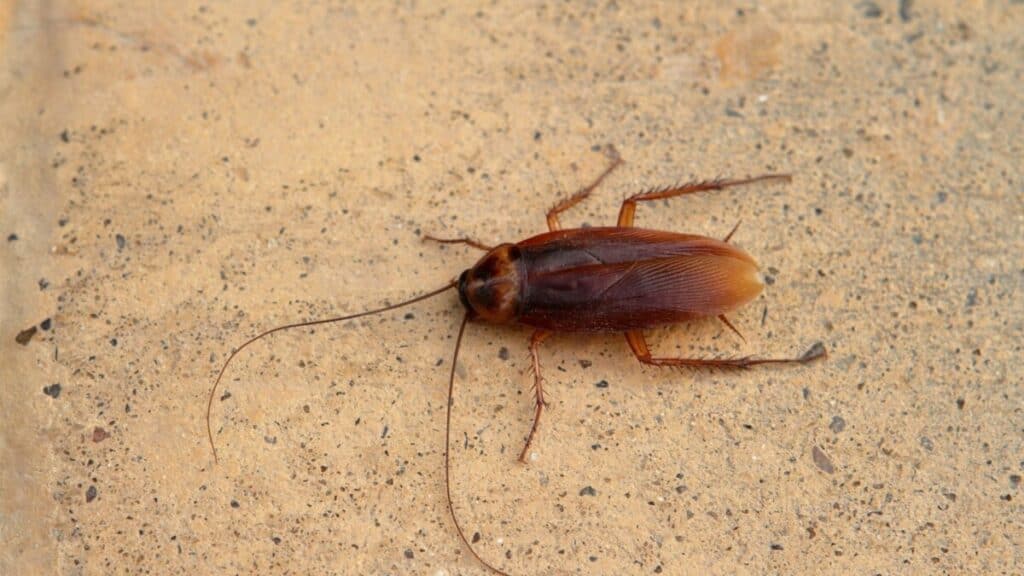
Factor #1: Location
Depending on where you live, roaches may or may not be a common occurrence. There is at least one species of cockroach on every continent except for Antarctica.
Cockroaches are a common household pest throughout the United States, but depending on which region you are located, you’re more likely to encounter some species than others.
The four most common cockroach species in the United States are:
- American roaches – the most common cockroach species in the US, American roaches prefer a wetter environment and are most often found around pipes and drains. Despite their name, American roaches are commonly found in other areas of the world.
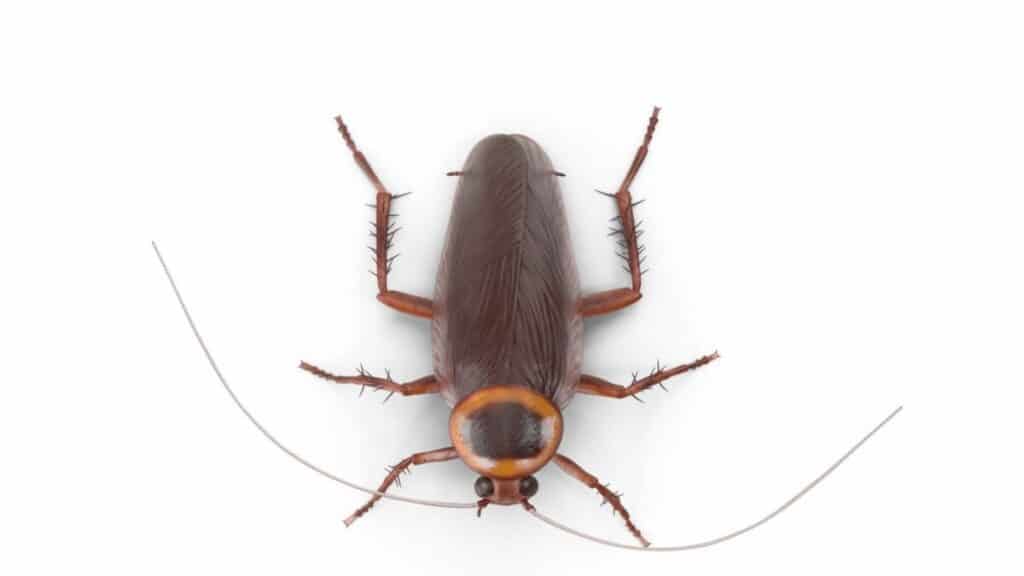
- Brown-banded cockroach – these roaches prefer warm and dry climates with a high elevation, such as the American Southwest.
- German cockroaches – most commonly associated with poor sanitation, German roaches prefer warm, damp, and humid climates. They are most commonly found in bathrooms and showers, where there is more access to standing water. German cockroaches are the most common roach found throughout the world.
- Oriental cockroaches – also called “water bugs” or “black beetle cockroaches” due to their dark, shiny body, Oriental cockroaches are most commonly found in the northern regions of the United States.
Factor #2: Garden and Landscaping
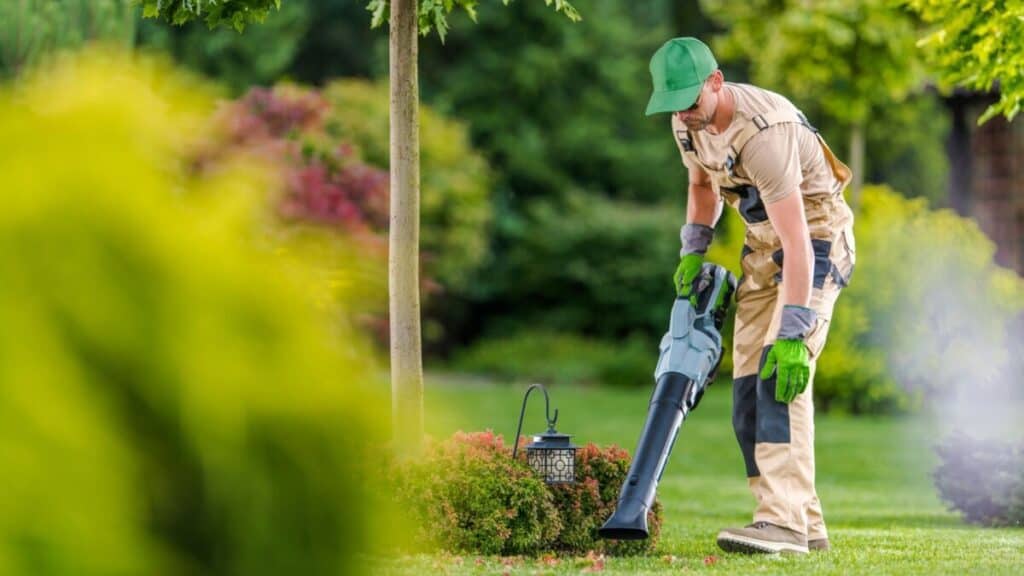
Outside of your house, there are many reasons why cockroaches are attracted to your landscaping. Standing water in flowerpots, birdbaths, and gutters provides roaches with plenty of water to survive.
Compost and overflowing trash cans provide roaches with food.
Mulch, leaf piles, and dense vegetation provide roaches plenty of shelter.
Once roaches discover these sources of food, water, and shelter, they’re unlikely to leave.
Factor #3: Access to Your Home
An important thing to keep in mind is that roaches can squeeze into the smallest openings in your home that you may not even realize, such as:
- Exterior cracks
- Pipes
- Dryer vents
- Loose window screens
If your home is old or poorly maintained, roaches have easy access to the inside of your house.
They are also particularly drawn to shared housing, such as apartment complexes, hotels, condos, and shelters because of the easy access roaches have between units.

If one apartment has few resources for roaches, the pests can easily move onto the next unit and return when resources become available.
Applying caulk to any small spaces you notice will eliminate the roaches’ entry point to your house.
Cleaning regularly, including vacuuming – since crumbs and residue are difficult to spot on the carpet – will also deter roaches.
Roach Factor #4: Food and Moisture
If you are someone who repeatedly leaves dirty dishes in the sink or puts off taking out the trash until it’s overflowing, you’re likely no stranger to seeing cockroaches in your home.
As stated in this article, roaches come inside searching for food, water, and shelter, and leaving leftover food and stagnant water out is nothing short of an invitation.
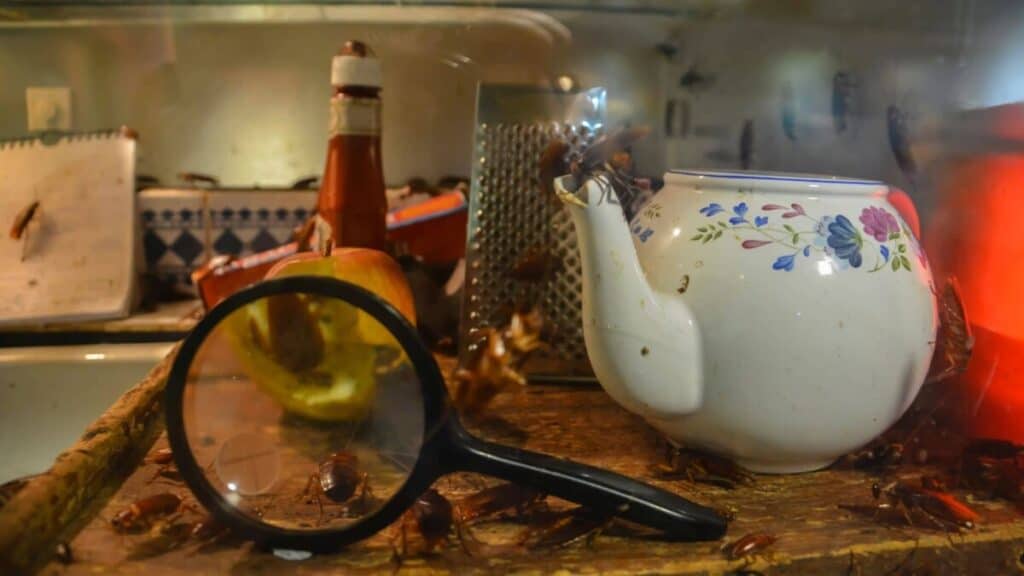
Even in the cleanest kitchens, roaches can go for days at a time without eating and aren’t particular about what they eat.
Even a few crumbs left on the floor will attract them, or even a squished piece of food under your trash can. Roaches have an incredible sense of smell, so they will be able to sense what is available.
If you have pets, the residue from pet food and water sitting out in pets’ bowls will attract roaches.
How do I Prevent Roaches?
Remove all sources of food, water, and shelter that are listed above. Keep your home clean and thoroughly inspect every potential entry point for roaches, such as dryer vents, exterior cracks, or loose window screens.
Maintain your home regularly and avoid leaving dishes in the sink or procrastinating taking out the trash.
Outside your home, keep woodpiles away from the side of your house, as well any compost. If you have any pets, clean up any crumbs, residue, or standing water after your pets’ meals.
While German roaches are the species of roach most attracted to poor sanitation (dirty bathrooms/kitchen, sticky floors, etc.), the other species will still infest a relatively clean home.
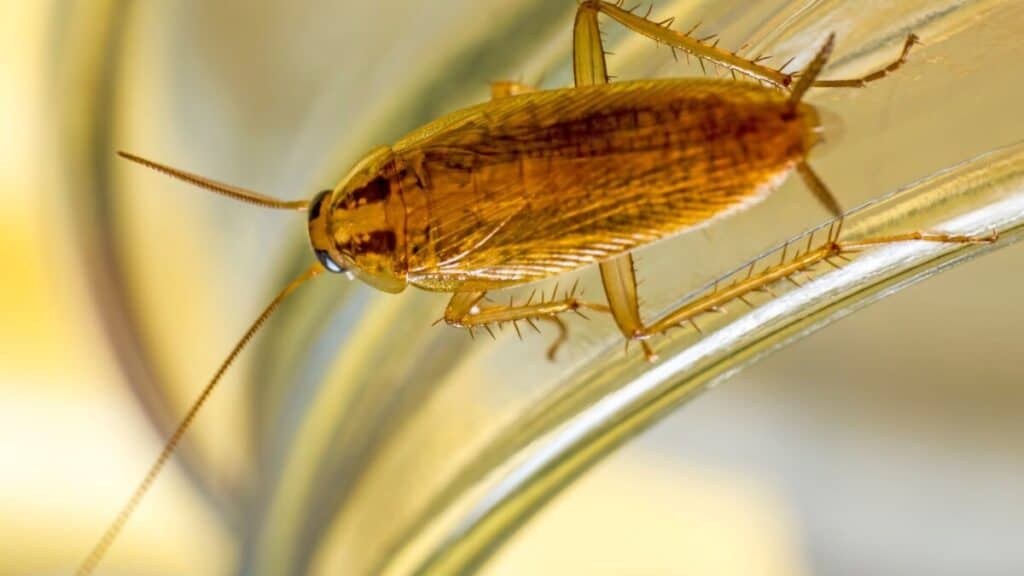
Properly storing your food in airtight containers is one way to keep roaches away, as well as cleaning any kitchen appliances that usually go unnoticed.
It isn’t uncommon to prepare a smoothie in a blender and then forget to clean up the sticky residue, especially if there isn’t much.
Don’t forget to clean off your stove top, as well. Roaches will feast on the buildup of fat, crumbs, and dried sauces.
Are There Any Natural Roach Repellants?
There are some popular home remedies, both effective and ineffective, for cockroaches.
This article will inform you if any of these home remedies are effective, and if so, how to safely use them to get rid of roaches.
Does Boric Acid Kill Roaches?
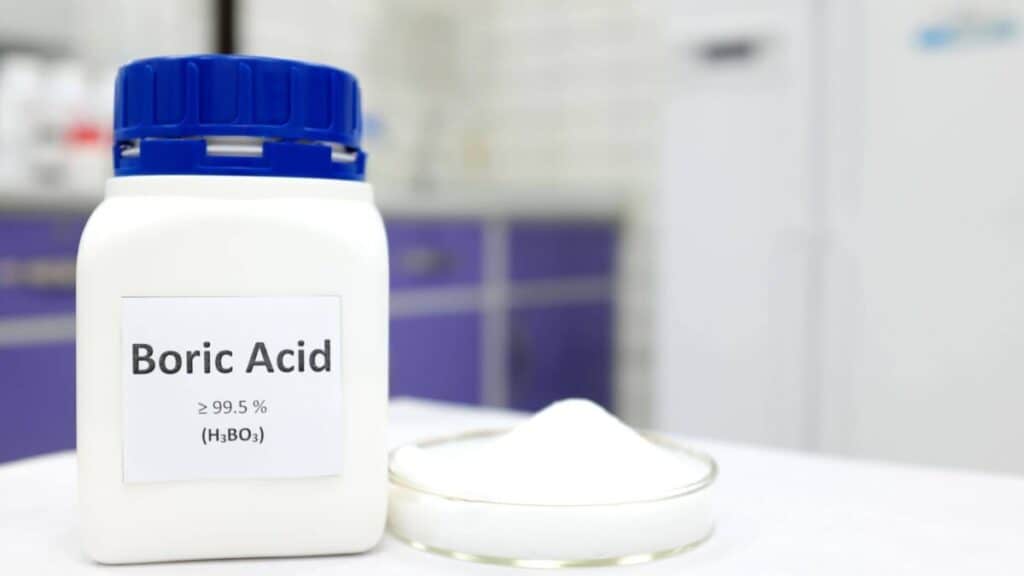
Boric acid, when applied correctly, is an effective roach killer. It is sold in bulk in many stores, and the laundry detergent Borax is a common source of it.
Boric acid can be dissolved in water and sprayed along your kitchen and bathroom floors, or anywhere you see roaches.
You can apply it to the ground outside woodpiles, compost heaps, and mulch, where it will absorb into the soil and keep roaches away. It can also be sprinkled in powder form.
It’s suggested by many natural pest control sites to mix the powdered boric acid with a little bit of white sugar to attract the roaches to it.
The boric acid works when cockroaches come in physical contact with it (such as walking through it) and absorbing it into their body, effectively killing them.
Besides cockroaches, boric acid is also an effective pesticide for silverfish, termites, fleas, ants, and beetles.
Boric acid has low toxicity to humans but can be very dangerous when ingested by children and pets.
After applying the boric acid, make sure to keep children and pets away from the places where the chemical is applied.
Does Isopropyl Alcohol Kill Roaches?

More commonly known as rubbing alcohol, isopropyl alcohol is a common and effective home remedy for keeping roaches at bay.
As long as the mixture is at least 70 percent alcohol, it penetrates the roach’s exoskeleton and absorbs into their bloodstream, killing them.
Isopropyl alcohol can be used to repel a variety of household pests, including aphids, mealworms, and whiteflies. However, it cannot be sprayed on plants without causing serious harm or death to the plant.
Can Mothballs Kill Roaches?
A common myth, mothballs will not kill roaches. In fact, due to the chemical composition of mothballs and the likelihood of getting discovered or ingested by children or pets makes it dangerous.
Mothballs are designed for use in small, enclosed spaces, such as dresser drawers or refrigerators.
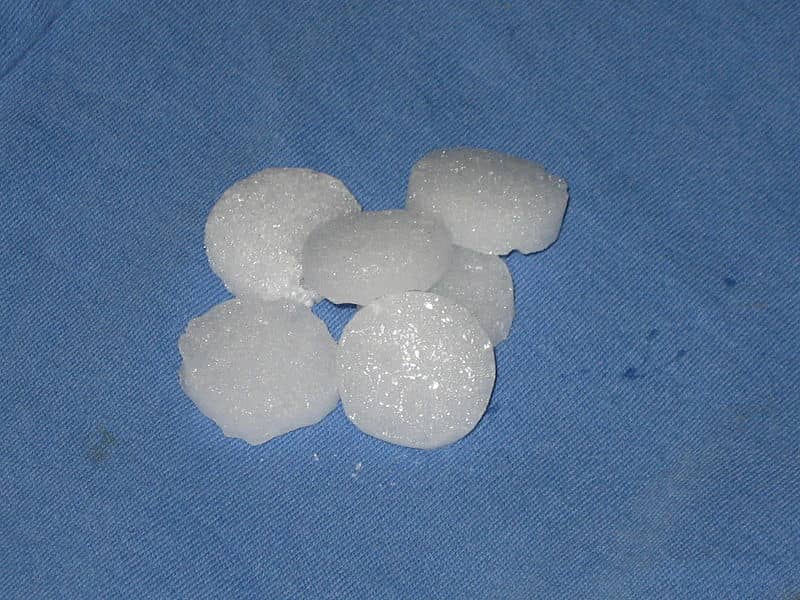
While mixing dish soap with water is effective when dealing with one or two roaches, it doesn’t always work and is ineffective against a roach infestation.
Plus, you have to spray every roach directly with the mixture of water and dish soap, which is impractical and time-consuming.
Does Baking Soda Repel Roaches?
Baking soda is a natural cockroach repellant. DIY pest control websites suggest making a bait, such as mixing the baking soda with sugar or onions, in order to make it more appealing to the roaches.
Like boric acid, application can be messy.
What About Citrus?
Citrus is a common scent for many household cleaners, and for good reason.

The scent of citrus alone is a natural repellent to roaches, so adding some lemon oil to your mop water will be enough to keep the roaches at bay. It’s safe and can be used in a household with children and pets.
The downside to citrus is that it has to be applied repeatedly to keep the roaches away and doesn’t kill the roaches. This is less than ideal when dealing with an infestation.
Alright, that’s it for this article, here are a few hand-selected articles that you might also find interesting reads:
What to Do If Your Apartment Is Infested with Roaches?Can Roaches Adapt to Boric Acid? – The Surprising Answer
Does Lysol Kill Roaches? The Facts And Results
Recent Posts
Tiny Black Bugs in Bathroom NO WINGS: What They Are and What to Do!
Finding tiny black bugs in your bathroom can be uncomfortable, to say the least. Especially if they are persistent, or they appear in very large numbers, which they often like to do. When it...
Tiny Black Bugs in Plant Soil - What Are They & What To Do About It
A short horror story: You get a new houseplant. You do your best to take care of it. You’ve ensured that it has the right soil, the right amount of sun, it gets enough water. And then one day, you...

